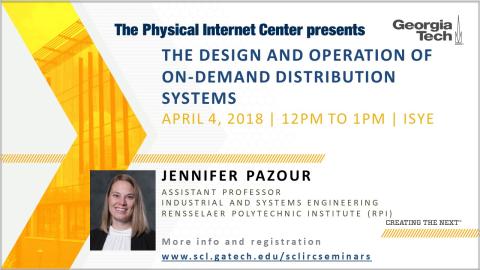event
PIC Seminar: The Design and Operation of On-Demand Distribution Systems (A PIC/SCL seminar)
Primary tabs
ISyE, PI and SCL affiliated faculty, corporate partners, Industry Advisory Board members, PI affiliated students, ISyE PhD students and MSSCE students:
Please join us for...
Wednesday, April 4, 2018 | 12-1pm
ISyE Main Building - 228 Executive Education Room
Presented by Jennifer Pazour
Assistant Professor of Industrial and Systems Engineering
Rensselaer Polytechnic Institute (RPI) in Troy, NY
OVERVIEW
Modern distribution systems need to fulfill a wide variety of requests quickly with little warning in small units to many dispersed locations at low costs. This is fundamentally different than yesterday’s demand, which aggregated at fixed (store) locations. Existing distribution solutions, which are often static and have long decision lead times, are too rigid for today’s customers. Resulting in today’s supply chains being optimized for yesterday’s customers. To close the gap between current supply chain operations and customer expectations, this research rethinks supply chain design. By accessing resources on-demand, rather than through ownership, on-demand distribution platforms enable elastic supply capacity that can be scaled up and down, as well as moved in response to changing requirements. Yet, capacity cannot be set. Instead it must be enticed from suppliers (who provide access to their resources). Current centralized approaches to platform design excel at meeting demand commitments, but limit supplier autonomy. Decentralized approaches provide supplier autonomy, but sacrifice systematic performance and are time consuming. This research proposes a new hierarchical approach, recasting the platform's role as one providing personalized recommendations (i.e., a menu of multiple requests) to suppliers. Supplier choice can increase participation (capacity) and resource utilization when request fulfillment is combined with suppliers' original planned tasks. Prioritizing a quick time to match and efficient systematic resource coordination, the platform first decides how multiple, simultaneous recommendations are made. Then, suppliers have autonomy to select requests (if any) from the personalized recommendations. To guide design questions, we create a bilevel optimization framework. These models are novel as they capture the interdependent outcomes of supplier selections. By harnessing the problem’s structure, we transform the computationally expensive mixed integer linear bilevel problem into a single level problem by proposing logical expressions. For a platform only partially able to estimate suppliers' utilities, we investigate how personalized recommendation sets can be used as a coordination mechanism able to balance desirable platform, suppliers, and demand request outcomes. As the number of choices increases, suppliers have a higher chance to be recommended a request they are willing to select. This benefits the platform, up to a point. However, due to misalignment between the suppliers and the platform’s utilities, a larger number of choices lead to suppliers selecting a request with lower platform benefit. Also, as the number of choices increases, less systematic coordination occurs, and the chance for rejected requests increases. We quantify the impact of our hierarchical approach compared to a centralized, decentralized, and stable-matching approaches for a variety of scenarios and provide insights in what influences the optimal number of choices based on a ride-sharing application.
ABOUT THE SPEAKER
Jennifer Pazour, Ph.D. is an assistant professor of Industrial and Systems Engineering at Rensselaer Polytechnic Institute (RPI) in Troy, NY. Her research and teaching focus on the development and use of mathematical models to guide decision making for logistics and supply chain challenges. She is a recipient of a National Science Foundation Faculty Early Career Development (CAREER) Award (2018), a Johnson & Johnson Women in STEM2D Scholars Award (2018), a Young Investigator Award from the Office of Naval Research (2013), a National Academies of Science Gulf Research Program Early-Career Research Fellowship (2016), and the 2017 recipient of the Dr. Hamed K. Eldin Outstanding Early Career IE in Academia Award from IISE. She holds three degrees in Industrial Engineering (a B.S. from South Dakota School of Mines and Technology, and a M.S. and Ph.D. from the University of Arkansas), and was previously on the faculty at the University of Central Florida. More information can be found at her research and teaching blog: http://jenpazour.wordpress.com/
Register Online by March 30th.
Groups
Status
- Workflow status: Published
- Created by: Andy Haleblian
- Created: 03/26/2018
- Modified By: Andy Haleblian
- Modified: 03/26/2018
Categories
Keywords
User Data
Target Audience

